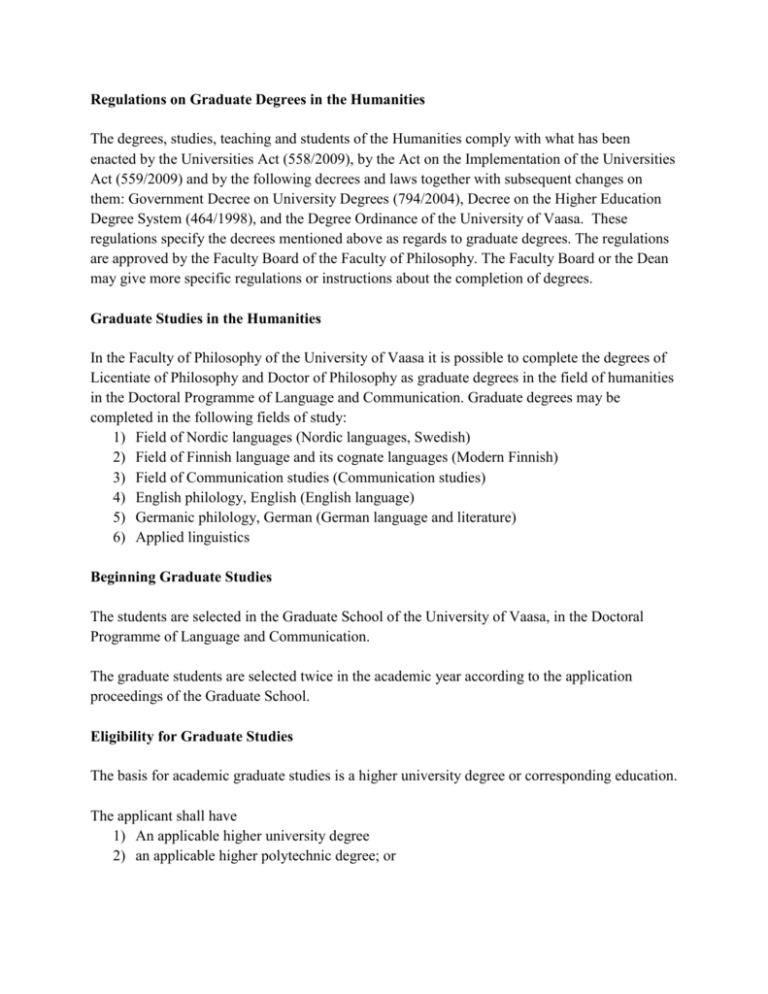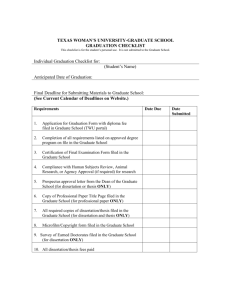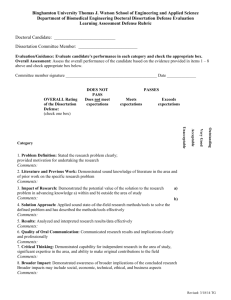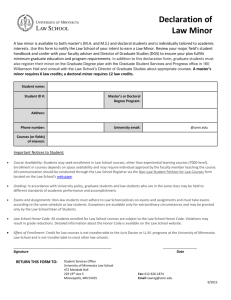Regulations on Graduate Degrees in Humanities
advertisement

Regulations on Graduate Degrees in the Humanities The degrees, studies, teaching and students of the Humanities comply with what has been enacted by the Universities Act (558/2009), by the Act on the Implementation of the Universities Act (559/2009) and by the following decrees and laws together with subsequent changes on them: Government Decree on University Degrees (794/2004), Decree on the Higher Education Degree System (464/1998), and the Degree Ordinance of the University of Vaasa. These regulations specify the decrees mentioned above as regards to graduate degrees. The regulations are approved by the Faculty Board of the Faculty of Philosophy. The Faculty Board or the Dean may give more specific regulations or instructions about the completion of degrees. Graduate Studies in the Humanities In the Faculty of Philosophy of the University of Vaasa it is possible to complete the degrees of Licentiate of Philosophy and Doctor of Philosophy as graduate degrees in the field of humanities in the Doctoral Programme of Language and Communication. Graduate degrees may be completed in the following fields of study: 1) Field of Nordic languages (Nordic languages, Swedish) 2) Field of Finnish language and its cognate languages (Modern Finnish) 3) Field of Communication studies (Communication studies) 4) English philology, English (English language) 5) Germanic philology, German (German language and literature) 6) Applied linguistics Beginning Graduate Studies The students are selected in the Graduate School of the University of Vaasa, in the Doctoral Programme of Language and Communication. The graduate students are selected twice in the academic year according to the application proceedings of the Graduate School. Eligibility for Graduate Studies The basis for academic graduate studies is a higher university degree or corresponding education. The applicant shall have 1) An applicable higher university degree 2) an applicable higher polytechnic degree; or 3) an applicable education completed abroad which in the awarding country gives eligibility for corresponding higher education (Universities Act 558/2009). If the degree which grants eligibility for graduate studies is not completed by the end of the application period, it may be considered to conditionally accept the applicant. The degree certificate shall then be delivered to the university before the right to study begins. Student Admissions In addition to general requirements, the prerequisite for beginning graduate studies is a thesis included in the advanced studies which has been awarded cum laude, good (3) or other grade of comparable level, and other advanced studies completed with at least grade good in the major subject of the graduate degree or in other comparable studies. The applicant shall, if necessary, complement his/her studies in order to achieve sufficient skills to start graduate studies. In the selection, attention is paid to the applicant’s study and research plans, and to the sufficiency of the resources of the unit for guidance and for organizing graduate studies. The topic of the applicant’s research shall fit the subject areas of the research groups in languages and communication. In order to be accepted as a graduate student, the applicant shall meet the selection criteria stated above, the head of the unit supports granting the study right for graduate studies and accepts the research plan and the personal study plan. The students selected to complete a graduate degree are accepted by the Dean based on the statement of the leader of the doctoral programme. A primary supervisor and other possible supervisors are appointed to each student if their applications are successful. At least one of the supervisors must be a professor or a docent. Study Right for Graduate Studies Those who have been accepted as graduate students receive the study right for the Doctoral degree in Philosophy. A person accepted in graduate studies may complete a Licentiate degree, when s/he has completed graduate studies stipulated by the Faculty. The licentiate thesis is included in the Licentiate degree. Curricula of Graduate Studies The studies leading to a degree shall be organized so that a student can complete a doctoral degree in four (4) years of full-time study and a licentiate degree in two and a half years (2.5) of full-time study. The curricula of graduate degrees are usually confirmed for two years. Personal Study Plan A graduate student shall write a research plan together with the supervisor and agree on the principles of guidance in writing. The study plan shall be updated annually and it is used to regularly follow the advancement of studies. Full-time and Part-time Students All active graduate students belong to the Graduate School. The personal study plan may be written either for four years (full-time graduate students) or for six years (part-time graduate students). The guidance and resources of the university are mainly aimed at full-time students. A supervisor shall have at the most five full-time graduate students. Scope and Structure of a Doctoral Degree The scope of the doctoral degree is 240 ECTS, and the degree can be completed in four years when studying full-time. The doctoral degree consists of research skills (40 ECTS) and a dissertation (200 ECTS) The curricula on graduate studies contain more specific regulations on the scope, contents and completion methods of studies included in the doctoral degree. Evaluation of Studies The credit units are evaluated as passed or failed. A passed credit unit may also be evaluated on a five-step scale (1-5) so that grade 1 = passable, 2 = satisfactory, 3 = good, 4 = very good, and 5 = excellent. The assessment of a doctoral thesis and a licentiate thesis is described later. A student may ask for a rectification in the assessment of a credit unit or a thesis. The Degree Ordinance of the University of Vaasa contains more details about rectification. Certificates The Dean grants a degree certificate after the student has applied for a certificate. In addition to the degree certificate, A Diploma Supplement intended particularly for international use shall be given to graduates. The degree certificate of a doctoral degree includes the title of the doctoral thesis, its grade and the field of science. In addition, the scope and possible grade of the studies included in the doctoral degree are mentioned. The degree certificate of a licentiate degree includes the title of the licentiate thesis as well as the scope and possible grade of the studies completed. The degree certificate of a doctoral degree awarded after a licentiate degree includes the name of the doctoral thesis and its grade and field of science. A person who has completed a doctoral degree, and whose dissertation is written in some other language than Finnish or Swedish, and whose public defence of the dissertation has been in some other language than in Finnish or Swedish can be awarded a degree certificate in English in addition to the one in Finnish, if he or she so wishes. Completion of Graduate Degrees Licentiate Degree A person accepted as a graduate student may complete a Licentiate degree in Philosophy, when s/he has completed the academic graduate studies ordained by the faculty (40 ECTS) and written a licentiate thesis (110 ECTS). Licentiate Thesis The licentiate thesis shall show that the student is conversant with his/her research area and is able to apply the scientific methods independently and critically. The licentiate thesis shall be a scientific presentation based on independent research in the area of one of the subjects. The licentiate thesis is usually an unpublished monograph. According to the Degree Decree (A 794/04) a licentiate thesis may also be a research consisting of several scientific publications or manuscripts which also presents the objectives and methods of the study and includes a part that summarises and evaluates the research. Also, a research which meets corresponding scientific criteria may be accepted. The publications may also include joint publications if the contribution of the doctoral candidate to the work can be clearly indicated. The research may also be an online publication or in digital form. Pre-Examination and Assessment of Licentiate Thesis After hearing the unit, the Dean appoints two examiners for the research. At least one of the examiners shall come from outside the Faculty. The examiners of a licentiate thesis shall have a doctorate degree or other equivalent academic qualification. Provisions on disqualification applied also to the examiners are enacted in the Administrative Procedure Act (434/2003, Sections 27-28). The research is publicly examined in the seminar of the study subject in question. For the public examination, the thesis shall be displayed in public for at least 10 days before the examination of the work. The student agrees with the supervisor on the number of printed copies of the work for the public examination. The student shall also save the licentiate thesis electronically in the University library’s database. The decision about the acceptance of the licentiate thesis is made by the Dean on the basis of the examiners’ written statements. The examiners shall suggest either to pass or to fail the thesis. No grade is awarded for the licentiate thesis. Before the decision is made, the licentiate candidate is reserved the right to submit a plea to the statement made by the examiners. The researcher may apply to the Degree Committee of the University of Vaasa for rectification of the assessment within 14 days of the day when the decision was served. Doctorate Degree According to Government Decree (794/2004), the objective of a doctoral degree is that the student is well versed in one’s own field of science and research area and shows independent and critical thinking in one’s research area, as well as achieves the ability to produce independent new information. In order to complete a doctoral degree, a student shall complete academic graduate studies, write a dissertation and defend it in public. Doctoral Dissertation The doctoral dissertation shall be a research based on independent scientific research, which is examined in the public defence of doctoral dissertation. The dissertation may be a monograph or a so-called article-based doctoral dissertation. The recommended maximum length of a monograph is 250 pages, excluding appendices. Article-based Dissertation An acceptable dissertation may also consist of several scientific publications or manuscripts accepted for publication that are related to the same theme, and a summary written on those publications, or another work that meets corresponding scientific criteria. The publications can also be joint publications, if the doctoral candidate’s independent part of the work is clearly shown. (Degree Decree 794/2004, Section 22) At the beginning stages of an article-based dissertation, the doctoral student and the primary supervisor shall agree on the form and publication plan of the dissertation. An article-based dissertation shall form an entity and correspond to a monograph in its scientific level and other criteria. An article-based doctoral dissertation consists of several, depending on the scope, at least three scientific publications that are related to the same theme. At least half of the publications included in the dissertation shall be already published or accepted for publication in refereed journals, conference proceedings or compilations. The publications can also be joint publications, if the doctoral candidate’s independent part of the work is clearly shown. An article-based dissertation cannot include parts of a previous dissertation by the same author. For justified reasons, the same publication may also be used as part of another person’s dissertation. In special cases negotiations are made with the primary supervisor and the leader of the doctoral programme. Other Dissertation Forms A dissertation may also consist of several published monographs of a combination or a monograph and an article/articles. In this case the dissertation includes a similar summary and evaluation which has been described in connection with an article-based dissertation. The research may also be a so-called digital research, which means that it may include metatextual structures and other forms of multimedia. In this case the public shall have the opportunity to examine the digital realization of the work in the public defence of the dissertation, but also before the public defence, for example in a previously notified website address. Furthermore, the research and its technical realization shall be summarized in paper form. The assessment of a dissertation is always based on the whole dissertation, irrespective of the form of the dissertation. Submitting the Doctoral Dissertation for Pre-Examination The doctoral dissertation may be submitted for official pre-examination when the supervisor/supervisors of the dissertation give permission to start the pre-examination process. The work submitted for pre-examination shall be finished and the language shall be fluent and without mistakes. The Assessment Criteria and Application of the Grading Scale In the assessment of a dissertation, attention is paid to: 1) 2) 3) 4) 5) 6) 7) 8) Choice of topic, research problem and delimitation of the work Being well versed in the field of research and taking previous research into consideration Managing the topic theoretically, conceptual clarity and definitions Coverage and treatment of material Methods used in the research Theoretical and practical significance of results Consistency and clarity of the presentation Defending the research in the public defence Passed with distinction The work is especially deserving academically. The results are very significant in their own research area. In case of an article-based dissertation, part of the articles are published in valued academic forums. The dissertation has been defended excellently in the public defence. Passed The work is a coherent presentation based on independent research. It produces new scientific information and is linked in a relevant way to previous research. The dissertation has been defended well in the public defence. Failed The work is not a coherent presentation based on independent research, or it has serious flaws in several of the following areas: setting of the aim and limitation of the scope are unclear; the work has no clear contribution; both the theoretical framework and the empirical part have serious weaknesses or problems; the author’s critical analysis is missing or is very minor: there are great flaws or problems in defining central concepts of the work and/or justifying the central choices in the work. The assessment of a dissertation is always based on the whole dissertation, irrespective of the form of the dissertation. Accepting the Dissertation The grade of the dissertation is confirmed by the Dean. Rectification of Assessment The researcher may apply to the Degree Committee of the University of Vaasa for rectification of the assessment within 14 days of the day when the decision was served. The Dean gives more specific instructions on the Faculty-specific details related to the dissertation process, such as the time of the public defence and the language used in the public defence. Entry into Force of the Regulations and Transitional Provisions The Faculty Board gives further instructions on applying these regulations, if necessary. The regulations will come into force starting from 1 January 2014, and they will repeal previous regulations on graduate degrees. Students who have started their graduate studies before 1 January 2014 may follow the previous curricula, if they so wish. However, the grading scales apply to all graduate students starting from 1 January 2014. Doctoral Programme of Language and Communication Graduate Studies (40 ECTS) 1. 2. 3. 4. 5. 6. Philosophy of Science (3-5 ECTS) Research Ethics (3-5 ECTS) Methodology (5-10 ECTS) Graduate seminars (3-10 ECTS) Other studies related to the research area (5-20 ECTS) Academic and other working life skills (5-10 ECTS)





